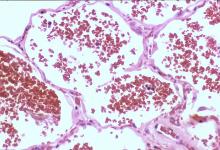FDA Arthritis Advisory Panel Endorses Tofacitinib Approval for Psoriatic Arthritis Save

On Thursday, August 3, the FDA Arthritis Advisory Committee (AAC) met to consider Pfizer’s application to approve tofacitinib for use in patients with psoriatic arthritis. The panel had 11 voting members, including adult and pediatric rheumatologists, statisticians, pharmacologists and patient representatives.
The sponsor was seeking FDA approval for the use of tofacitinib (TOFA) for the treatment of adult patients with active psoriatic arthritis.
The Vote
Efficacy. After extensive review of the data, voting members were near unanimous in stating that the data demonstrated the efficacy of TOFA for the above indication.
- There were 10 votes in favor and 1 vote against the EFFICACY of tofacitinib in PsA.
Safety. The FDA and sponsor reviewed the safety portfolio of TOFA when given to patients with PsA. While there was agreement that the safety profile seen in PsA approximated that seen in RA, there was some discussion on comparative rates of serious infections (SIE), herpes zoster events and other JAK related safety issues.
- There were 10 votes in favor and 1 vote against the SAFETY of tofacitinib in PsA.
Approval. After a robust discussion over the importance and labeling implications of the failed radiographic data (see below), the panel was asked to vote on whether tofacitinib should be approved for use in active PsA at the propose dosed of 5mg bid (or 11 mg qd).
- There were 10 votes in favor and 1 vote against the approval of tofacitinib in PsA.
Background
Tofacitinib has been studied in 6300 RA patients and 783 PsA patients with over 22,000 patient-years (PY) of use and up to 9 years of drug exposure in clinical trials. Since approval for RA the drug has been given to more than 83,000 patients. The data leading up to this hearing is based on 2 placebo-controlled trials and one open-label safety extension trial in PsA:
- Study 1091 – 422 TNFi naïve PsA patients were studied for 24 weeks with a 12 week primary endpoint of ACR20 and HAQ-DI. There were 4 arms: PBO, TOFA 5 mg bid, TOFA 10 mg bid and adalimumab (ADA) 40 mg EOW
- Study 1125 – 395 TNFi-IR PsA patients for 24 weeks with a 12 week primary endpoint of ACR20 and HAQ-DI. There were 3 arms: PBO, TOFA 5 mg bid, and TOFA 10 mg bid
- Study 1092 – 2 yr. long term extension trial
The efficacy data showed clear separation from PBO for both doses of TOFA, with little/no difference in clinical outcomes between the 5mg and 10 mg bid doses. They also showed significant efficacy compared to PBO for enthesitis, dactylits and patient reported outcomes (FACIT-F, SF-36, HAQ). Dropouts were higher with placebo and lower with TOFA.
Safety review showed all adverse events in 48-50% of TOFA patients and serious adverse events (SAE) in 1.7% of patients; these data were not different than PBO. There were 4 deaths. Analysis of SIE showed low rates ( 2 SIE/100 PY) that were comparable to that seen in ADA treated patients (1.08 SIE/100PY). An expected difference was noted with zoster events; none with ADA treatment and 1.5-2.0 HZ/100PY in TOFA treated patients. Cancer, MACE, and lab abnormalities were similar to that observed in RA clinical trials and product label.
The risk benefit analysis revealed the number needed to treat (NNT) to be 3-8 (to achieve an ACR50, or improved dactylits, enthesitis, PASI75). The favorably compared to the number needed to harm of 110-256 for H.zoster and 320-511 for a serious infection (numbers representing the 5 mg and 10 mg dose respectively).
The 1091trial did assess x-ray outcomes but all groups, including the placebo group showed very little change over 12 months. Thus, while no radiographic indication was being sought, none was achieved in this study. The sponsor noted that radiographic studies were done to “makes sure that there was no radiographic worsening while patients improved clinically".
Summary
The panel consistently voted in favor of approving TOFA on the basis of robust and consistent clinical efficacy and a safety profile in keeping with what is already known about the agent.










If you are a health practitioner, you may Login/Register to comment.
Due to the nature of these comment forums, only health practitioners are allowed to comment at this time.